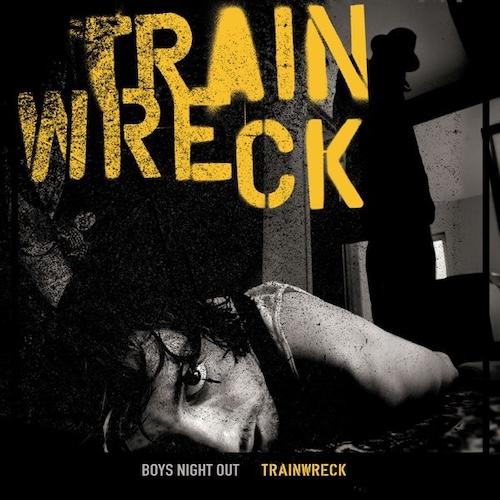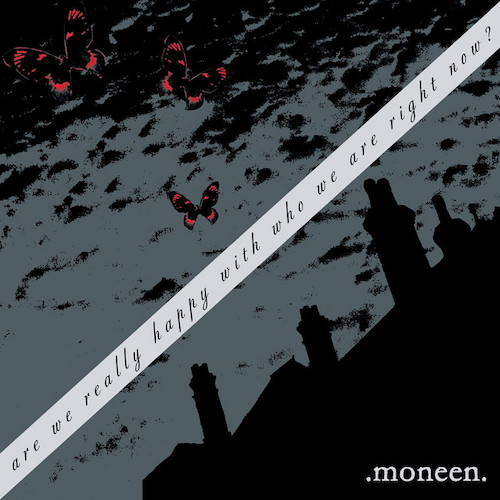

Trainwreck
Boys Night Out
The term 'concept record' can be thrown around fairly loosely; used to categorize albums that centre around a specific set of themes. In my opinion, a true concept record is more narrative driven. There are many examples of bands attempting to spin album-spanning tales, however, finding one that tells a coherent story while abiding by musical constraints is somewhat of a rarity. Now I haven't heard some of the most celebrated or classic concept records -- and therefore might be speaking out of turn -- but I can confidently say that one of the all-time greatest concept records is Trainwreck from Burlington, Ontario-based band Boys Night Out. Prior to this release, the band had a tendency for depicting abuse, violence, and self-destructive tendencies on a superficial level that wasn't unlike the rest of their emo contemporaries. For Trainwreck, writers Jeff Davis and Connor Lovat-Fraser continued to explore these dark themes in far greater depth and sharpened their narrative focus. In the end, they conceived a disturbing tragedy of Shakespearean proportion.
Trainwreck tells the story of "The Patient", who in the throes of a violent nightmare, murders his wife. We then follow him on his harrowing journey towards rehabilitation. At first, things are looking up; he's committed for treatment, and under the watchful eye of a psychiatric doctor, shows signs of progress. While apprehensive, "The Patient" convinces his doctor that he is fit to leave the psychiatric hospital and signs off on his release. Once he finds himself back at home, alone, "The Patient" embarks on a rapid spiral of self-destruction. Still disgusted with his actions, he resorts to self-mutilation; an altruistic act meant to protect others in addition to having physical markers that help him distinguish between hallucination and reality. Regardless, the line between what's real and what's not continues to blur as untreated infection mixed with a cocktail of psychiatric medication and alcohol causes his mental state to severely deteriorate. He becomes all-consumed by a song of unknown origin, a mental construct that reconnects him with his wife. The closer he gets to death, the stronger the connection becomes. The macabre tale comes to a close with "The Patient" succumbing to his ailments, but not before his doctor stumbles upon him. He documents "The Patient"s final moments, observing him singing to the song in his head, with a smile, with his final breath.
Developing a strong narrative is one thing, but setting it to music and maintaining its dynamic integrity is a completely different challenge; one that Boys Night Out rises to. The songwriting on Trainwreck helps bring every scene to life with riveting detail. The jarring beginning of Dreaming feels exactly like waking from a nightmare, and the start-stop rhythms in the first verse emulates sleep-addled brain fog. When the reality of what the protagonist has done finally sinks in, the tempo suddenly comes to crawl; a void is created for which Lovat-Fraser howls into. Another example is on the key track Purging, who's driving pace and dissonant, tremolo strummed chords place us at the centre of "The Patient"s spiraling thoughts. Sharp keyboard stabs and the grinding of buzz saws also plague the track, instilling horror and psychological torment. Both Recovering and Composing have moments of serenity as "The Patient" sinks into drug abuse on the former, and on the latter, attempts to poison family and friends to create a swaying (convulsing) and singing chorus line for his symphonic delusion. One final example is Lovat-Fraser's performance on the closing track Dying. His fried croak that is weak and barely on key perfectly conveys the madness and frailty of "The Patient" in his final moments. The instrumentation that supports him is a theatrical dirge, thanks mostly to the sound of blaring funeral organs. I could touch on so many other instances in which the music and story perfectly reinforce each other, but we'd be here all day. You'll just have to take my word for it.
If the positives ended there, Boys Night Out would have completed the challenge with flying colours, but the cherry on top is that the playing and performances are also incredible. Davis' guitar playing totally rips. It's melodic, it's dissonant, it's technical, and it has guitar-hero-levels of articulation. I'm also a huge fan of Brian Southall's drumming. His effortless style and endlessly creative fills have heavily influenced my own playing over the years. Between the guitar and drums, I would definitely classify Trainwreck as a 'musician's' record. Then there's the vocals which are awesome across the board. In addition to being theatrical, Lovat-Fraser's vocals are very dynamic. He kills every single belt, fried phrase, and harmony. He's supported by Davis' harsh screams at key moments, and even keyboardist Kara Dupuy accurately portrays the role of the wife with her angelic performances. Trainwreck is without a doubt the complete package. It nails the concept, the songwriting, the performances, and does it all in one-of-a-kind style. Those who know seem to have come to a similar consensus, and those who don't are seriously missing out.
10
Standouts: You have to listen to the whole thing.
Alternative Rock, Emo (2005) Ferret. Reviewed September 24th, 2025






